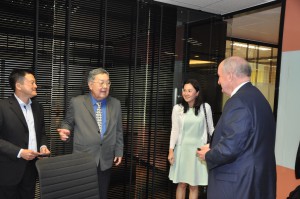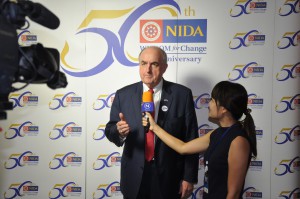A commitment to partnership and engagement in Southeast Asia
Among the hallmarks of Indiana University’s rich tradition of international engagement — which now goes back more than 100 years — has been a vigorous pursuit of institutional partners around the globe that share IU’s commitment to expanding the worldview of its students and responding through first-rate faculty research and scholarly collaboration to society’s most pressing problems.
On Friday morning, members of the IU delegation rekindled one of the university’s oldest relationships — a partnership with Chulalongkorn University. CU was established in 1917 and is now the oldest university in the modern Thai educational system.
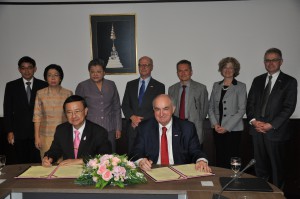
IU President Michael A. McRobbie, front right, and Pirom Kamolratanakul, president of Chulalongkorn University, front left, renew a longstanding agreement between their respective institutions.
Over a period of more than two decades, a collaborative agreement between IU and CU has generated numerous successful scholarly and research exchanges involving such standout IU academic units as the Kelley School of Business and School of Public and Environmental Affairs. Another exchange, between CU and IU Bloomington’s College of Arts and Sciences, has resulted in CU providing a Thai language instructor to IU’s School of Global and International Studies.
The parallels between IU and CU, which made the two universities such natural partners when they inked their initial agreement in 1974, persist today. CU, which celebrated its centennial anniversary just last year, is among Thailand’s top research universities, with 13 schools and institutes that teach around 40,000 students, around the same number of students enrolled at IU’s Bloomington campus. Both IU and CU boast comparable strengths in, among other areas, the arts and humanities, the life, natural and social sciences, business and public health. More generally speaking, both share a strong commitment to service and to addressing modern society’s most vexing issues.
As delegation members learned today, CU is increasingly encouraging its faculty, which includes a large number of IU Thai alumni with whom the delegation met this morning, to engage in research collaborations with peers from other parts of the world. The university’s hope is that these collaborations will lead to positive changes in dynamic and culturally diverse Southeast Asia, a region of the world confronting a number of major political, economic, environmental and security challenges.
President Barack Obama outlined many of the major issues facing the region when he hosted a historic two-day summit in February with the leaders of all 10 Southeast Asian institutions. These are challenges “no nation can meet alone,” Obama said in his introductory remarks at the U.S.-ASEAN Leaders Summit in California. He then laid out his vision for the region, our nation’s fourth largest goods trading partner, which he described as “economic growth that is inclusive, creating opportunity for all; mutual security and the peaceful resolution of disputes; human dignity, including respect for human rights and development that is sustainable.”
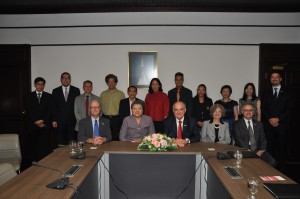
Members of the IU delegation pose for a picture with IU Thai alumni who are members of the faculty at Chulalongkorn University.
Despite Obama’s recent efforts to call attention to the challenges of Southeast Asia, the leaders of both IU and CU agreed that not enough is known in the U.S. about the strategic importance of this region of the world and that by leveraging their strengths they might serve as important catalysts for change here.
To this end, they came together this morning to renew, for another five years, their agreement of friendship and collaboration in hopes of increasing the number of student and faculty exchanges between IU and CU, including in the areas of Thai language and cultural studies, and developing joint research projects and other collaborative activities that focus on improving difficult international issues.
As further evidence of IU’s and CU’s mutual recognition of the power of global partnerships to bring about change, both universities have worked in recent years to dramatically enhance their international programs.
Back in Bloomington, IU’s efforts have resulted in the creation just a few years ago of the School of Global and International Studies, now housed in the spectacular new Global and International Studies Building, which U.S. Secretary of State John Kerry helped dedicate last fall. They’ve also inspired a newly established Southeast Asian and ASEAN Studies program, which IU President Michael McRobbie and Vice President for International Affairs David Zaret described today as one of the only programs in the nation dedicated to fostering a greater and more comprehensive understanding of Southeast Asia and its people, languages and cultures. (McRobbie also noted that the first-ever U.S. ambassador to ASEAN, David Carden, is an IU graduate and 2014 recipient of IU’s Thomas Hart Benton Medallion, which recognizes those who have provided outstanding service and support to the university.)
Here in Bangkok, CU recently opened a magnificent new International Affairs and Global Network Building, which McRobbie, Zaret and other members of the delegation toured today and that includes most of its international resources for faculty and students. The building is a major reflection of the remarkable growth in internationalization at CU, which, in just the last few years, also includes new efforts to attract top scholars from around the world to work on major ASEAN issues and plans for a summer program offering Thai studies to foreign students.
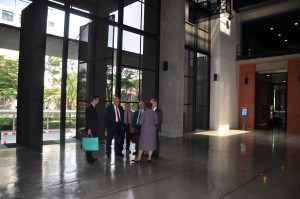
IU delegation members tour the new Office of International Affairs and Global Network Building at Chulalongkorn University.
The new building also houses the ASEAN University Network, established just over 20 years ago to help promote the development of higher education within the region and serve as the main coordinating agency of several of Southeast Asia’s top universities. Included among the AUN member universities are several of IU’s major institutional partners in the region, including CU, the National University of Singapore and Vietnam National University.
The visit to CU also gave members of the IU delegation an opportunity to meet with the executive director of the ASEAN University Network, Nantana Gajaseni, and discuss ways in which IU might become more engaged with the network through its traditional strengths in international affairs and foreign education and its more recent establishment of a global gateway network that will soon include an office in Southeast Asia.
“IU is a beneficiary of all of these efforts, as we work to build our expertise in Southeast Asian and ASEAN studies,” remarked Zaret just prior to the renewal of one of IU’s most successful partnership agreements. “All of what has happened here at CU, in Thailand and across the region promises to provide a wonderful opportunity for IU.”
IU’s inspiring Thai alumni
In addition to talking with more than a half dozen of its alumni who are now serving in key roles on CU’s faculty, McRobbie and Zaret also took time after leaving the CU campus to reconnect with three other prominent alumni who have had a remarkable impact on Thai society, through their work at top levels of government, education and culture.
Saisuree Chutikul, who earned her master’s and doctoral degrees at IU Bloomington, had an accomplished career as a pianist and advocate for music performance in Thailand, but she’s equally renowned for her work in government and, specifically, for leading numerous major human rights efforts to improve the lives of women and children in Thailand.
Boudin Tamthai, who earned a master’s degree in East Asian Languages and Cultures at IU Bloomington in 1979, currently serves as director of The Tamthai Foundation, a non-governmental charitable foundation in Bangkok. A firm believer of the power of education, Boudin has dedicated his life’s work to helping to provide funds and training for the promotion of knowledge in Thailand, especially to benefit the disadvantaged. He served as president of the Thailand Chapter of the IU Alumni Association from 1984 to 1990. He also coordinated the IU International Alumni Conference and Reunion that was held in Chiang Mai, Thailand, in 1999.
Sombat Thamrongthanyawong is a professor of public administration at the National Institute of Development Administration and a graduate of both NIDA and CU. The former president of NIDA from 2007 to 2012 and an internationally acclaimed scholar and researcher, he received an honorary degree of humane letters from IU in 2013.
Among the topics of conversation the IU delegation discussed with these three inspiring and remarkably accomplished alumni: the establishment, later this year, of a new IU global gateway office in Southeast Asia, which would be the fourth such IU office around the world, joining others in Beijing, Berlin and New Delhi.
A homecoming at NIDA
If members of the IU delegation felt right at home at CU, they felt equally welcome at a homecoming reception for NIDA, which IU played a central role in establishing 50 years ago.
Like yesterday’s 50th anniversary conference, at which President McRobbie delivered a keynote address, tonight’s fun and festive event at NIDA gave delegation members an opportunity to reconnect with old friends and reflect on a half-century-old partnership that has had a transformative impact on Thai education and society.
It also offered a nice reminder that behind any successful partnership, there are people, continually pushing it to evolve and constantly working to respond to society’s complex and ever-changing needs.
As McRobbie said in his keynote address at NIDA yesterday, “It is not merely the relationships between institutions that are of importance. The relationships that develop between people as part of these global collaborations are just as important, in both good times and in bad. In bad times, these relationships can help to improve difficult international issues. In good times, they can help to rapidly build productive relationships between nations.”
A related note:
Just in time for Thailand, IU has unveiled a powerful new digital map that provides a snapshot of IU’s activities in Southeast Asia and every region in the world. The online map, located at worldwide.iu.edu/interactive-map, provides information from every IU campus on every global and international studies-related degree, foreign language and study abroad program offered and all international partnerships, as well as access to more than a quarter century of IU International magazine articles associated with every country in the world. The project was created in partnership by the Office of the Vice President for International Affairs and IU Communications.
Tags: ASEAN University Network, Bangkok, Barack Obama, Boudin Tamthai, Chulalongkorn University, College of Arts and Sciences, David Carden, David Zaret, IU Alumni Association, IU Global Gateway Network, John Kerry, Kelley School of Business, Michael A. McRobbie, Nantana Gajaseni, National Institute of Development Administration, Pusadee Tamthai, School of Global and International Studies, School of Public and Environmental Affairs, Sombat Thamrongthanyawong, Southeast Asia, U.S.-ASEAN Leaders Summit



